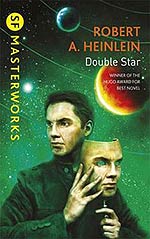
![]() couchtomoon
couchtomoon
1/20/2014
![]()
Like the hero of Heinlein's 1956 novel Double Star, Robert Heinlein is the master of dual identities.
At least in my mind.
Robert Heinlein is the reason I avoided vintage SF for so long. His reputation as a writer of nerd-boy wet dreams was broadcast loud enough to hear over the grunge music blasting in my bedroom while I read quest-obsessed novels. I don't know where I gleaned this bias against good ol' boy Bob, but it's accurate. His gruffness, his male chauvinism, his homophobia… I see it every day in my Texas town. Why would I want to read about it?
But I made the mistake of transferring that bias to other vintage authors who I never read, and who never deserved that reputation. And Heinlein has contributed much to the SF genre, so we have to cozy up at some point. Biases be damned!
And that's how I've gotten to know the other Robert A. Heinlein. The Heinlein who strives for scientific accuracy, while sustaining bold, creative thought. The Heinlein whose simple, rhythmic storytelling feels familiar and comfortable, even when it gets weird. The quotable Heinlein, who can sum up the human experience in short, poignant blurbs. The Heinlein who probably deserves his "grandmaster" status.
The Story
Pathetic, unemployed actor, Lawrence Smith, is hired to double for the kidnapped political icon of Mars, John Joseph Bonforte. Smith tells his story in a first-person, reflective narrative, in which he recounts his mortifying space flight, and his bizarre induction into a powerful Martian family, among other adventures. But this temporary gig turns indefinite when the real Bonforte is returned to his camp in terrible shape.
Double Star is self-explanatory and straightforward, with a satisfying, albeit safe, ending. The pathetic guy nails the job, gets the girl, and transforms into a better person, all while saving the human inhabitants of Mars from the murderous threat of Martian retribution for tardiness. It's a fun story, but certainly not mind-blowing, and wouldn't win any awards today, if written by a different author.
Smith's experience of traveling from Earth to Mars is the most compelling part of the tale, in which he gets space sick, and struggles for days under 3G pressure, all while studying the subject he is expected to emulate. Heinlein sticks to the science of his day, with practical technology for interplanetary travel, but with some '50's terminology, like stereo-vid. The medical care of his world hinges on hypnotism – which happens to cure anything from prejudice to hysterics. And I'll bet you can't guess the gender of the character who needs hypnosis for hysterics.
And therein lies Heinlein's handicap. Despite his efforts to push intellectual boundaries and espouse free-thinking, his chauvinism and homophobia date his work more than anything else. Other vintage SF authors make similar mistakes, but I attribute those mistakes to historical context. Heinlein just seems so much more… aggressive… about his observations of women and men.
For that reason, he is a relic of the genre. His stories may strive to be progressive, but his voice is the ever-present artifact that reminds the reader that "this book is old-timey." It's like listening to somebody's crotchety old grandpa tell a relatively interesting story. According to Heinlein, women can be important and intelligent, but they are also prone to hysterics, and sometimes they need a fanny-spanking and a Valium, as a reminder of who's boss.
(Insider fact: Therapists will tell you they have seen more hysterical men than women, by the way.)
Heinlein may be quote-worthy, but I don't think I'll ever warm up to him. He comes off as a creep. He's the kind of dude who would dismiss my opinions in a business meeting, but stare at my ass when I walk out of the room. Le Guin is quote-worthy, too, and I wouldn't mind being alone in a room with her.
But I've only just scratched the surface of the Heinlein catalog. Asimov's treatment of women evolved over time. Does Robert Heinlein ever grow up? (My research says "no.")
http://couchtomoon.wordpress.com/2014/01/20/double-star-by-robert-a-heinlein/